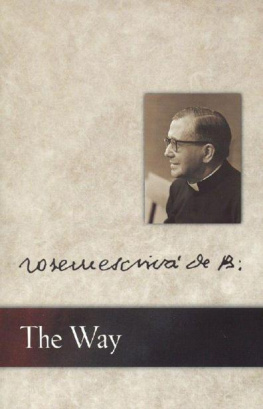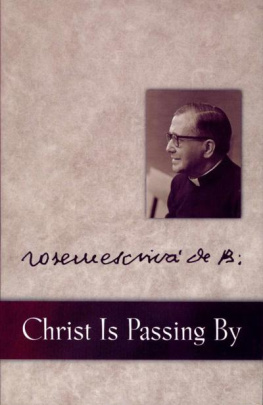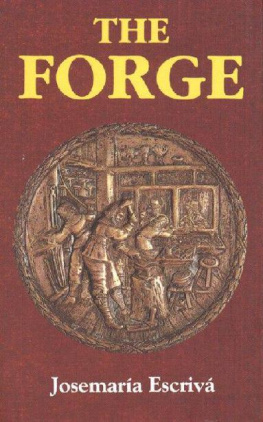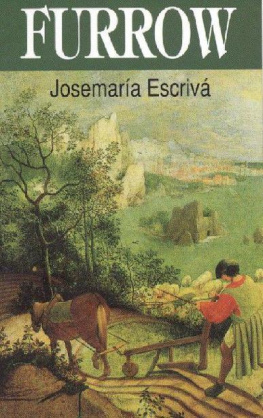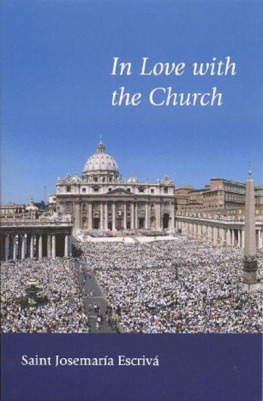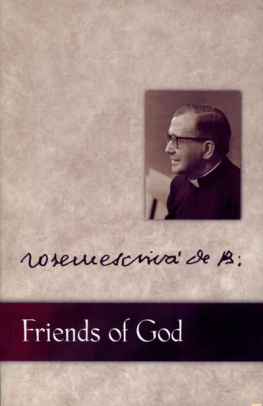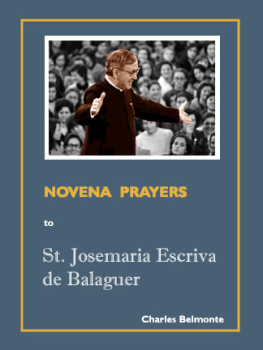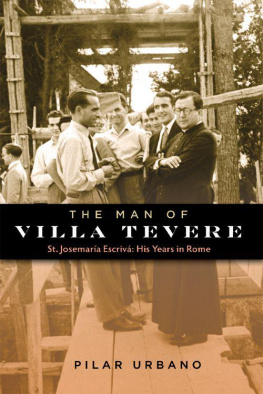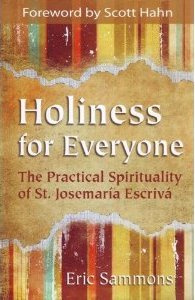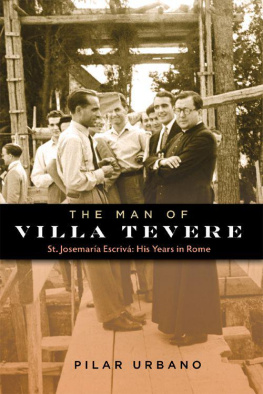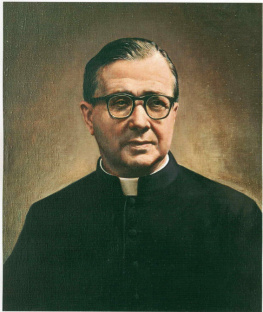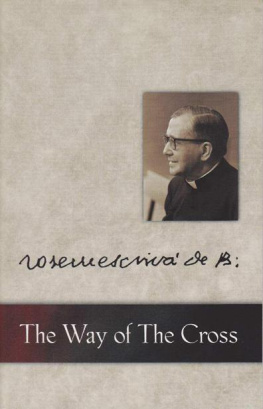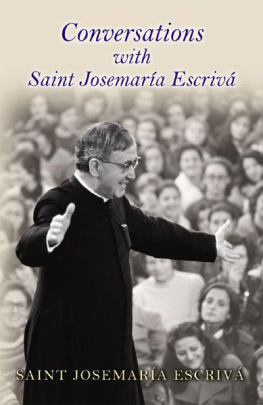St Josemaría Escrivá - The Way
Here you can read online St Josemaría Escrivá - The Way full text of the book (entire story) in english for free. Download pdf and epub, get meaning, cover and reviews about this ebook. year: 0, genre: Religion. Description of the work, (preface) as well as reviews are available. Best literature library LitArk.com created for fans of good reading and offers a wide selection of genres:
Romance novel
Science fiction
Adventure
Detective
Science
History
Home and family
Prose
Art
Politics
Computer
Non-fiction
Religion
Business
Children
Humor
Choose a favorite category and find really read worthwhile books. Enjoy immersion in the world of imagination, feel the emotions of the characters or learn something new for yourself, make an fascinating discovery.
- Book:The Way
- Author:
- Genre:
- Year:0
- Rating:3 / 5
- Favourites:Add to favourites
- Your mark:
- 60
- 1
- 2
- 3
- 4
- 5
The Way: summary, description and annotation
We offer to read an annotation, description, summary or preface (depends on what the author of the book "The Way" wrote himself). If you haven't found the necessary information about the book — write in the comments, we will try to find it.
The Way — read online for free the complete book (whole text) full work
Below is the text of the book, divided by pages. System saving the place of the last page read, allows you to conveniently read the book "The Way" online for free, without having to search again every time where you left off. Put a bookmark, and you can go to the page where you finished reading at any time.
Font size:
Interval:
Bookmark:

The Way
JOSEMARA ESCRIV
The Way

Library of Congress Cataloging-in-Publication Data
Escriv de Balaguer, Jos Mara, 19021975.
[Camino. English] The Way / Josmara Escriv. p. cm. Includes indexes. ISBN 1889334413 (alk. paper) ISBN 1889334421 (pbk.: alk. paper)1. Spiritual lifeCatholic Church. I. Title. BX2350.3 .E8313 2002
248.482dc21
2001054978
THE WAY
For more information on the life and writings of St. Josemara,
please visit the following Websites:
www.josemariaescriva.info
www.escrivaworks.org
Originally published in 1939, 1950 as Camin o by Scriptor, S.A., Spain. Translation, introduction, footnotes, and indexes copyright 1982 by Fundacin Studium, Madrid.
English translation copyright 1982, Scriptor S.A. (Madrid).
First published 1982, Scepter Ltd, London.
This edition copyright 2002, 2010 Scepter Publishers Inc.
P.O. Box 211, New York, NY 10018
www.scepterpublishers.org
All rights reserved
eBook ISBN 978-1-59417-099-7
Printed in the United States of America
Contents
These penetrating lines, these concise thoughts are addressed to you, dear reader. Ponder each word and steep yourself in its meaning.
The spirit of God hovers over these pages. Behind each maxim is a saint who sees your intention and waits for your decisions. The sentences are left broken, for you to round them off with your conduct.
Dont recoil: your life is going to be a soothing of suffering. This is why you are a disciple of the Master!
Your worst enemy is yourself, because your flesh is weak and earthly, but you have to be strong and heavenly. The center of gravity of your body is the world; your center of gravity must be Heaven. Your heart is all Gods, and you have to consecrate its affections entirely to him.
Dont rest, dear reader. Always be watchful and alert, because the enemy does not take any sleep. If you turn these maxims into your own life, you will be a perfect imitator of Jesus Christ and a flawless gentleman. And with Christs like you, Spain will return to the old grandeur of her saints, scholars, and heroes.
+XAVIER, A. A. OF VITORIA
Vitoria, feast of Saint Joseph, 1939.
They are things I whisper in your earconfiding themas a friend, as a brother, as a father so that some thought will arise and strike you; and so you will better your life and set out along ways of prayer and of Love. With these words, which are the keynote of the entire work, the author begins a book whose purpose is to show men and women how to live in contact with God their Father day after day.
The Way was first published in 1934 under the title Consideraciones Espirituales , and in 1939, when the second, longer text appeared, it was given its definitive Spanish title, Camino . Since then millions of people, of varied races, cultures, and walks of life, have found in these words of Monsignor Escriv light and strength to help them recognize God and give meaning to their lives. The growth in the number of editions of the book in many languagesits circulation is now counted in millions of copiesis one of the clearest signs of how it has been received. In a very short time The Way has become a classic of spiritual literature, an Kempis for modern times, as some have described it.
This foreword, then, is designed not so much to present the book as to suggest the reasons for its success.
The Way shows the eternal character of the Church and at the same time its inexhaustible capacity for renewalthis was how a French journalist summed up the impression the book had made on him ( Le Figaro , March 24, 1964). This is in fact the main quality of The Way : the depth and vitality of its message, announcing as it does that the word of Christ is not something dead but a living reality capable of changing the life of every man who does not close his heart to it. The Way encourages the reader to confront himself with the Gospel and so relive Christs life: I dont understand how you can call yourself a Christian and lead such an idle, useless life. Have you forgotten Christs life of toil? ( The Way , 356); May your behavior and your conversation be such that everyone who sees or hears you can say: This man reads the life of Jesus Christ (2).
The Christian should live following the steps of the Master (213), accepting in a responsible way the mission which baptism confers on him: Go, preach the Gospel I will be with you. Jesus has said this, and he has said it to you (904).
The author of The Way shows that this invitation or calling does not in itself involve an invitation to leave ones place, to choose another way of life; in fact, for the great majority of Christians it is an invitation to face the ordinary circumstances of ones existence and find there a divine way which must be made holy. That is why Monsignor Escriv rejects the temptation to get out of place (832), because this amounts to avoiding the will of God. Each Christian must find a holiness in keeping with his own mission and his own state in life; and so the ordinary Christian, who lives in the middle of the world, should sanctify himself and others by means of the world itself, sanctifying his professional work and his whole life.
Human existence is thus set in a framework of faith, hope, and love. The reader grows in awareness of Gods presence and learns to listen to his voice, which speaks through the people and happenings of daily life. Too often we live as though our Lord were somewhere far offwhere the stars shine. We fail to realize that he is also by our sidealways. We have to be completely convinced, realizing it to the full, that our Lord, who is close to us and in Heaven, is a Father, and very much our Father (267). Get to know the Holy Spirit, the Great Unknown, the One who has to sanctify you. Dont forget that you are a temple of God. The Paraclete is in the center of your soul: listen to him and follow his inspirations with docility (57).
This supernatural message, this telling of God, is not given in The Way as a hollow exhortation but as an expression of an intensely vital life: these pages reflect Monsignor Escrivs work as a priest, which began in 1925. The book is in fact made up of passages from Sacred Scripture, snatches of conversation, personal experiences, passages from letters. In May 1933, for example, the author gave a young architectural student a present of a Life of Christ on which he wrote a few words as a dedication, and that was the origin of point 382: When I made you a present of that Life of Jesus , I wrote in it this inscription: May you seek Christ. May you find Christ. May you love Christ. These are three very distinct steps. Have you at least tried to live the first one?
This is one of the main attractions of the bookits direct, conversational style, its personal and deeply human character. As a reviewer in LOsservatore Romano (March 24, 1950) put it: Msgr. Escriv has written something more than a masterpiece; he has written straight from the heart, and straight to the heart go the short paragraphs which make up The Way .
This deeply felt humanity is not an accidental characteristic of the book: it is in fact part of the very essence of the spirit which pervades it. Monsignor Escrivs main thrust is precisely the statement that the human is not foreign to the divine: not a part of man but the whole man is loved and called by God and therefore the fully Christian spiritual attitude can be described as unity of life.
The above paragraphs have touched on some of the basic characteristics of the book and should help one to understand its lasting value. But these remarks would be incomplete if no mention were made of the historical importance of the book and the mark it has made on the history of the Church.
Next pageFont size:
Interval:
Bookmark:
Similar books «The Way»
Look at similar books to The Way. We have selected literature similar in name and meaning in the hope of providing readers with more options to find new, interesting, not yet read works.
Discussion, reviews of the book The Way and just readers' own opinions. Leave your comments, write what you think about the work, its meaning or the main characters. Specify what exactly you liked and what you didn't like, and why you think so.

